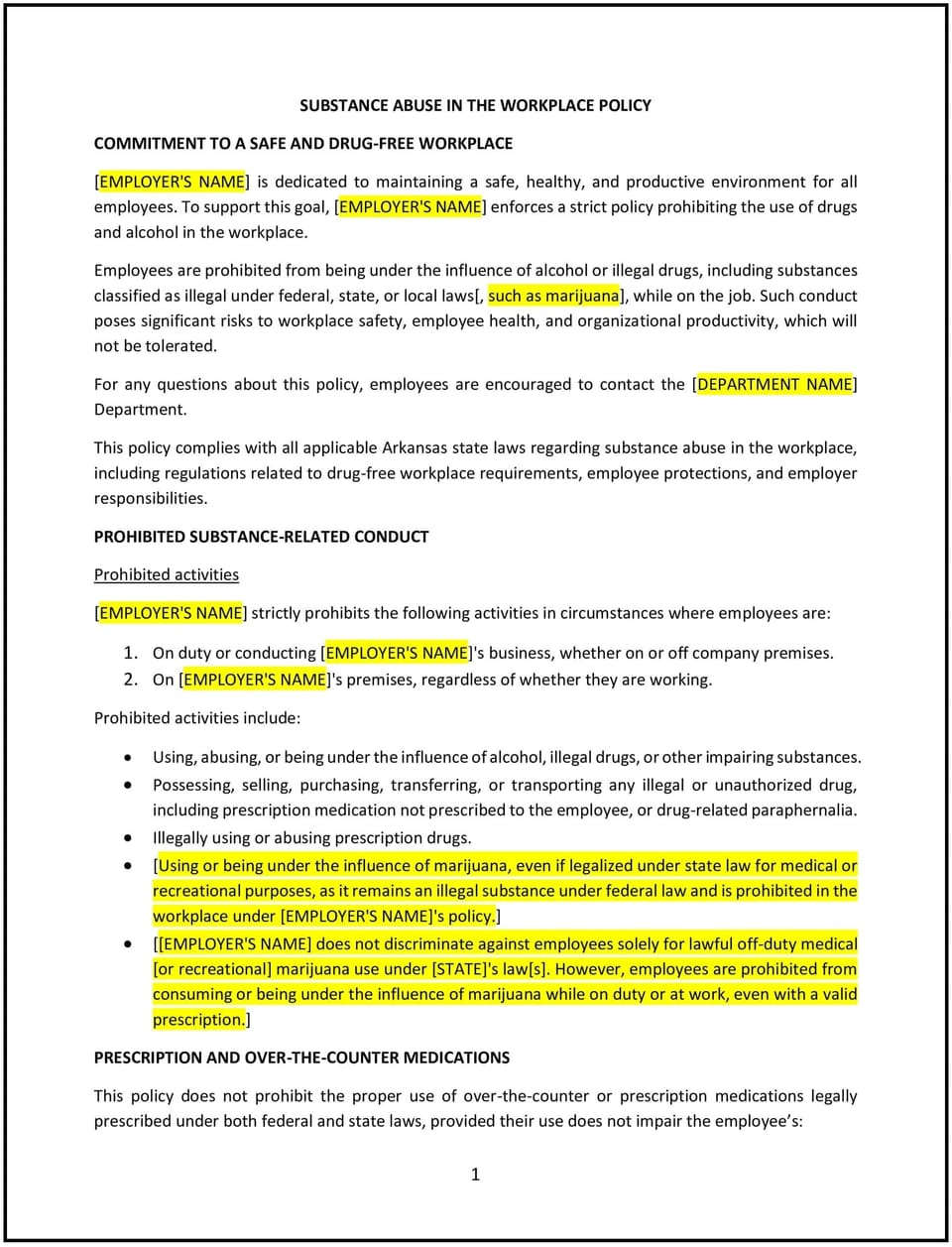Substance abuse in the workplace policy (Arkansas): Free template

Substance abuse in the workplace policy (Arkansas)
In Arkansas, a substance abuse in the workplace policy provides businesses with guidelines to prevent, address, and manage substance abuse issues to ensure a safe and productive work environment. This policy outlines prohibited behaviors, drug and alcohol testing procedures, and resources available to employees struggling with substance abuse.
By implementing this policy, Arkansas businesses can maintain workplace safety, promote employee well-being, and support compliance with state and federal laws, such as the Drug-Free Workplace Act.
How to use this substance abuse in the workplace policy (Arkansas)
- Define prohibited behaviors: Clearly specify that the use, possession, or distribution of illegal drugs or alcohol during work hours or on business premises is not allowed.
- Outline testing procedures: Include guidelines for drug and alcohol testing, such as pre-employment, random, or post-incident testing, while adhering to Arkansas laws.
- Communicate consequences: Specify disciplinary actions for violations, including suspension, mandatory treatment, or termination.
- Offer support resources: Provide information about employee assistance programs (EAPs) or other resources to help employees address substance abuse issues.
- Ensure confidentiality: Maintain the privacy of employees participating in testing or treatment programs to foster trust and compliance.
Benefits of using this substance abuse in the workplace policy (Arkansas)
This policy offers several advantages for Arkansas businesses:
- Enhances workplace safety: Reduces risks of accidents and injuries caused by substance use.
- Promotes productivity: Addresses substance abuse issues to minimize performance-related challenges and absenteeism.
- Supports compliance: Aligns with Arkansas-specific regulations and federal laws, including the Drug-Free Workplace Act.
- Encourages accountability: Establishes clear expectations and consequences for substance abuse, promoting a culture of responsibility.
- Provides support: Demonstrates the business’s commitment to helping employees address substance abuse challenges through available resources.
Tips for using this substance abuse in the workplace policy (Arkansas)
- Address Arkansas-specific considerations: Ensure the policy reflects state laws governing workplace drug and alcohol testing and employee privacy.
- Train managers: Provide training on identifying signs of substance abuse, conducting testing procedures, and addressing violations consistently.
- Use secure testing providers: Partner with reputable vendors to perform drug and alcohol tests to ensure accuracy and compliance.
- Communicate clearly: Ensure employees understand the policy, including the testing process, consequences, and available support resources.
- Update regularly: Revise the policy to reflect changes in laws, workplace practices, or testing technologies.
Q: How does this policy benefit the business?
A: This policy helps ensure workplace safety, supports compliance with Arkansas and federal laws, and provides a clear framework for addressing substance abuse issues.
Q: What types of testing are included under this policy?
A: The policy may include pre-employment, random, post-incident, or reasonable suspicion testing, as permitted by Arkansas laws and business practices.
Q: How does this policy support compliance with Arkansas regulations?
A: The policy aligns with state laws and federal requirements, such as the Drug-Free Workplace Act, to manage substance abuse fairly and lawfully.
Q: What resources can the business provide to employees struggling with substance abuse?
A: The business can offer access to employee assistance programs (EAPs), counseling services, or referrals to treatment programs to support recovery.
Q: How should the business handle violations of this policy?
A: The business should investigate incidents, document findings, and enforce disciplinary actions or support measures as outlined in the policy.
This article contains general legal information and does not contain legal advice. Cobrief is not a law firm or a substitute for an attorney or law firm. The law is complex and changes often. For legal advice, please ask a lawyer.


